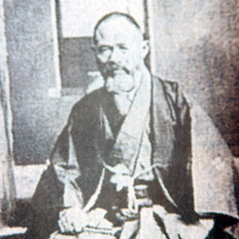|
Kurohei Arakawa: Meiji Era Detective
|
Fujiyama Dojo P.O. Box 20003 Thorold, ON, Canada L2V 5B3 (905) 680-6389 |
|---|
 The Meiji Era brought many changes to Japan. Tales abound of masterless samurai who struggled unsuccessfully to find a new role in society, of men who found themselves obsolete in a world that had no need for their skills. The Meiji Era brought many changes to Japan. Tales abound of masterless samurai who struggled unsuccessfully to find a new role in society, of men who found themselves obsolete in a world that had no need for their skills.
But there are also tales about those who managed to put their skills to good use, even in that era of new ways, new ideas, and new dangers. One of those tales is the one about Kurohei Arakawa. Kurohei was born in Asuwa-gun (present day Fukui city) in 1847. He was but twenty-three years of age when he was appointed to the special police task force in Asuwa (Fukui). In 1883, he solved a very difficult robbery case, tracked down and spectacularly caught the robber in such a manner that even today it would rival the plot of the best action film. It earned him the respect and admiration of his peers and marked the beginning of an illustrious career as a law officer. Kurohei Arakawa solved many criminal cases, and captured more than a thousand felons during his thirty-two years of police service, until his retirement in 1903. His exceptional work as a detective and his very effective efforts focused on maintaining public order and peace in the town of Mikuni. The legendary Kurohei's martial arts skills were matched only by his deductive abilities. He is remembered for his dexterous use of his trademark jutte and his ju-jutsu, his resourceful and intuitive criminal investigation methods, as well as his indomitable spirit and intelligence. His remarkable determination added to his reputation, since, for Arakawa, abandoning an investigation was never an alternative, no matter what the difficulties. Arakawa's martial skills and cunning mind were not obvious to those who met him the first time, due to the detective's mild and somewhat shy demeanor, but they would become more than evident when the need called for their use. He was not a social man, but was a personable one. Even though, day by day, he faced the worst of humanity, he never became cynical or embittered. It would be easy to look only to Arakawa's martial skills and enhance this side of his story, considering that this man was able to put himself in the middle of a violent riot, and pursue, subdue and capture many criminals unscathed. But there was more to his persona than great ability in the fulfillment of his duties. Arakawa also looked after ex-convicts and convicts released on bail with great care, and endeavored to initiate rehabilitation programs. For this, he was also known as a humane policeman. After Mr. Arakawa's death, his jutte was given to his son and grandson, who lived outside Fukui prefecture, who kept it as a valuable heirloom. A few years ago, Mr. Kurohei Arakawa's grandson, Yukio, who was then 52 years of age, ordered a replica of the jutte to be made. The iron weapon measure 40 cm, had a thickness of 1 cm, and the handle was wrapped in purple silk cord, ending in a tassel. This replica was presented to the Mikumi Police Station in remembrance of the illustrious detective. Looking at the original jutte, it is rather obvious that it was more than a symbol of authority for the legendary detective. There are marks on it that tell, more vividly than any narrative, of the dangers he faced while doing his duty. Kurohei Arakawa used bujutsu to protect his community, to save lives, to enforce the law, and keep the peace. While one reporter described him as a samurai who made a successful transition, another stated that he was indeed a samurai whose lord was the people's welfare, and, as a samurai, he never took his duty for granted, never considered failure as an alternative, and never surrendered his ethics to the circumstances. Whether one description is more appropriate than the other is irrelevant. There is a monument in Mikuni built in Arakawa's honor by 130 town volunteers. It bears the words zenikoukyo, taken from ancient Chinese poetry, which could be translated as "capture crime well". It is a fitting definition of the great detective's life, and a proper homage for a man who lived life, dutifully, quietly, and effectively. In that sense, he was indeed a samurai. |
|---|


